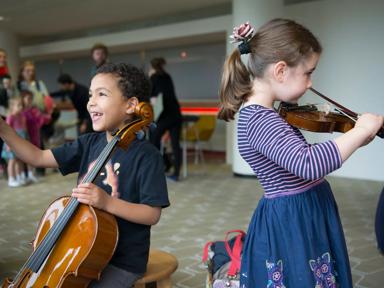Queen Elizabeth Hall & the evolution of electronic music
It’s the evening of Monday 15 January 1968. Parts of the UK are being battered by a terrible storm, with high winds across the country, but it’s not enough to keep the crowds away from Queen Elizabeth Hall, where the First London Concert of Electronic Music by British Composers is about to take place.
The concert is a sell out and hundreds of people have missed out on getting tickets. The first work on the much-anticipated bill is Potpourri by Delia Derbyshire, famous for her involvement with the BBC’s Radiophonic Workshop and, of course, as the composer of the iconic Doctor Who theme music.
Also in store for the audience are works by Tristram Cary and Peter Zinovieff. The latter premieres his work Partita for Unattended Computer. As the name suggests, there are no performers involved in its recital, just a teletype paper tape reader, sound-producing equipment and the computer.

Composer Francis Routh recalled this remarkable event in a 2012 blog post about Redcliffe Concerts of British Music.
‘A sell-out, a packed [Queen] Elizabeth Hall, a taxi queue extending to Waterloo Station, and reviews far longer and more detailed than was normally the practice, some showing insight, particularly those in scientific journals like Wireless World and Computer Weekly, all reflecting a high level of public curiosity, fed by the novelty value of the new technology.’
read Routh's blog post in full
Many concert goers were impressed more greatly by the technology, than they had been by the music. The Financial Times review said: ‘Technically it may be a triumph of skill and knowledge, but what we heard resembled the dreariest kind of neo-Webern drawn out to inordinate length.’ That may sound a cruel review, but Zinovieff himself admitted the sounds were simple, but that the effort that went into it was huge and the technology was incredible for the time.
Still, the impact on electronic music was significant. Zinovieff was now obsessed with creating digital music of various kinds, be it computer-composed ‘synthetic’ music or processed sounds.
A year after the Queen Elizabeth Hall concert Zinovieff founded Electronic Music Studios, with Tristram Cary and David Cockerell, and launched the groundbreaking VCS3, Europe’s first commercially produced synthesiser. The instrument had a huge impact on modern music, although a large reason for its invention was so EMS could raise money to finance the studio that Zinovieff had built in his garden in Putney.

Meanwhile, here at Queen Elizabeth Hall, the connection between synthesised sounds and traditional music continued with three more electronic music concerts organised by Redcliffe Concerts of Britain. The last of these took place on 26 November 1973 and featured Harrison Birtwistle’s Chanson de Geste for 4-track tape and instrumental ensemble, and a piece by Cary and Zinovieff called Exercise for a Passing Cloud for 4-track tape, where a computer gave instructions for improvisation on a clavichord based on weather pressure systems.
By this time the idea of the synthesiser has gone truly mainstream. with Brian Eno, the ever adventurous record producer and musician, deploying Electronic Music Studios' VCS3 on Roxy Music’s 1972 hit Virginia Plain.

1973 also saw our Queen Elizabeth Hall play host to the first ever live performance of another landmark in electronic music – Mike Oldfield’s Tubular Bells – as the waves from that night here in January 1968 continued to ripple across the world of music.
As Francis Routh noted in his 2012 blog piece, ‘One result of the [1968] concert was to stimulate the setting up of computerized studios in music colleges and the music departments of universities throughout the country. The concert had demonstrated the stage reached in computer technology in this country.’
When Queen Elizabeth Hall reopened in 2018, following a three-year closure for refurbishment, its place at the heart of the evolution of electronic music in the UK was reflected in its opening concert programme with the world premiere of Tyondai Braxton's composition TELEKINESIS; and Hannah Peel’s collaboration with Tubular Brass, Journey to Cassiopeia. To this day we continue a commitment to providing a platform for experimental artists.
